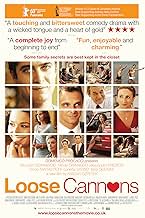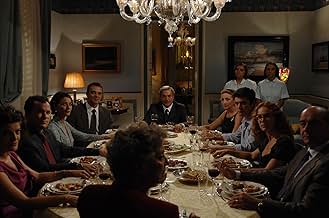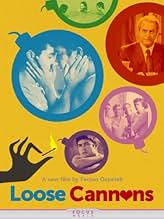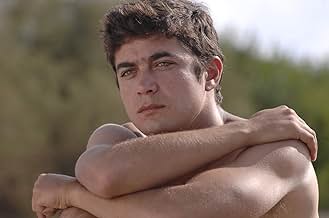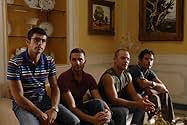CALIFICACIÓN DE IMDb
7.2/10
14 k
TU CALIFICACIÓN
Tommaso, el pequeño de los Cantones, una familia italiana tradicional del sur de Italia, decide contarles a sus padres que tiene novio.Tommaso, el pequeño de los Cantones, una familia italiana tradicional del sur de Italia, decide contarles a sus padres que tiene novio.Tommaso, el pequeño de los Cantones, una familia italiana tradicional del sur de Italia, decide contarles a sus padres que tiene novio.
- Dirección
- Guionistas
- Elenco
- Premios
- 34 premios ganados y 34 nominaciones en total
- Dirección
- Guionistas
- Todo el elenco y el equipo
- Producción, taquilla y más en IMDbPro
Opiniones destacadas
I saw this movie at the Chicago International Film Festival, along with 18 other movies, and it was, by far, the best movie in the festival. It was the only movie I attended that was applauded by the audience at the end of the film. I see that one of the film critics commented that the film was uneven because it couldn't make up its mind whether it was a comedy or a drama. It was both and worked on both levels, which is one of the reasons I loved it. it made me laugh and it made me cry. I think the best art is often like that. Gabriel Garcia Marquez' book "100 Years of Solitude" and Joseph Heller's "Catch 22" are examples of books that are very funny and very sad, sometimes for exactly the same reasons. I hope this film will be nominated for an Academy Award for Best Foreign Language Film. It deserves the recognition.
Juxtaposing with other Ozpetek's films I have watched (chronically STEAM: THE Turkish BATH 1997, LAST HAREM 1999, THE IGNORANT FAIRIES 2001, FACING WINDOWS 2003, SATURN IN OPPOSITION 2007), this time Ozpetek is palpably much smoother and more effortless to deal with his gay-oriented hallmark, shunning from all the melancholy and narcissism most homosexual films shamelessly over-exploit.
This film is struggling to overthrow FACING WINDOWS from the crown of my favorite Ozpetek's work (I do need a fresh re-watch of STEAM though). I do not dare to spoil anything here, one prominent astonishment comes at the near end, when the camera fluidly couples with different times, emanates a wonderful visual and spiritual poignancy which exactly one would love to experience from watching a decent film!
The cast may not be perfectly splendid, but every character is worth of some acknowledge for its ensemble undertaking, in particular for Ilaria Occhini (the grandmother in the film), a royal poise exuding from her own dignity, which counter-balances the dramatic banality of the coming-out-of-the-closet plight (namely a shade abominable presence of Ennio Fantastichini). Our leading man Riccardo Scamarcio (from THREE STEPS OVER HEAVEN 2004) may be in lack of a certain gay temperament as the chemistry between him and an irresistibly alluring Nicole Grimaudo is way more tangible here.
The comedy part in the film is somewhat showy but properly amusing; the intermittent interruption of grandma's marriage is adorably empathetic, also I cherish the balmy score (from Pasquale Catalano) and the moot ending which insinuates a positive perspective of the philosophy of our beings.
The blatant snub of 2011 Davide di Donatello awards (only one nomination for BEST MUSIC) is atrociously staggering in my opinion, but it will not stop Ozpetek from coming to be among the most promising virtuoso in the contemporary Italian cinema.
This film is struggling to overthrow FACING WINDOWS from the crown of my favorite Ozpetek's work (I do need a fresh re-watch of STEAM though). I do not dare to spoil anything here, one prominent astonishment comes at the near end, when the camera fluidly couples with different times, emanates a wonderful visual and spiritual poignancy which exactly one would love to experience from watching a decent film!
The cast may not be perfectly splendid, but every character is worth of some acknowledge for its ensemble undertaking, in particular for Ilaria Occhini (the grandmother in the film), a royal poise exuding from her own dignity, which counter-balances the dramatic banality of the coming-out-of-the-closet plight (namely a shade abominable presence of Ennio Fantastichini). Our leading man Riccardo Scamarcio (from THREE STEPS OVER HEAVEN 2004) may be in lack of a certain gay temperament as the chemistry between him and an irresistibly alluring Nicole Grimaudo is way more tangible here.
The comedy part in the film is somewhat showy but properly amusing; the intermittent interruption of grandma's marriage is adorably empathetic, also I cherish the balmy score (from Pasquale Catalano) and the moot ending which insinuates a positive perspective of the philosophy of our beings.
The blatant snub of 2011 Davide di Donatello awards (only one nomination for BEST MUSIC) is atrociously staggering in my opinion, but it will not stop Ozpetek from coming to be among the most promising virtuoso in the contemporary Italian cinema.
For a film in which each character harbours some tragic secret - of unrequited love, betrayal, unfulfilled ambition, alcoholism, a death wish or suchlike – Ferzan Özpetek's Loose Cannons is surprisingly uplifting.
In this family drama/rom-com-with-a-twist, the Istanbul-born Italian director combines precise aesthetics with good-looking actors, but, regrettably, Loose Cannons is also full of all-too-predictable stereotypes. This makes the film, despite its underlying theme of the pressures of stifling social conformism, easy on the eye and light of heart. Think Festen meets Women on the Verge of a Nervous Breakdown.
The loose cannons of the title are found amongst the Cantone family, the owners of a pasta factory in Puglia, in southern Italy. The father, Vincenzo, has decided that the time has come to hand over responsibilities to his sons, Antonio and Tommaso. His daughter's husband being an imbecile and his daughter being a woman, the brothers are the obvious heirs to the family business.
Tommaso, ostensibly enrolled in business school in Rome but actually a gay literature student with a novel freshly submitted to a publisher, returns home for a pompous dinner where Vincenzo plans to announce the generational handover in front of the entire family and some new business associates. Tommaso, having just confided in his brother that he is planning to use the occasion to reveal his literary and same-sex relationship aspirations, is himself taken by surprise at the dinner: Antonio beats him to it, coming out of the closet and triggering a heart attack in his father.
Antonio is disowned and Tommaso, afraid that opening up about his gayness would be a final death knell for his father, reluctantly steps in to manage the factory with the assistance of Alba, a beautiful young family friend with a nose for business deals and eye-catching pasta packaging. No matter how hard he tries, even caressing the freshly-baked pasta every morning as his grandfather used to, Tommaso can't develop a passion for macaroni. He wants to get back to Rome, to his writing and his gay lover, a bookish doctor.
While the film centres on Tommaso and his dilemmas, Loose Cannons has an assortment of characters with an assortment of repressed emotions. There's the homophobic and patriarchal father; the outwardly stoic, but in reality sensitive, mother; the daughter stuck in a passionless marriage with a podgy husband and two chubby daughters; the spinster auntie indiscreetly drenching her sorrows in whiskey; the diabetic grandmother dishing out pearls of wisdom; and the ugly, frustrated maid.
Though Loose Cannons is never dull, with plenty of narrative twists, flashback scenes and regular introductions of new characters, all the typecasting soon grates. The scenes with the multi-generational, loud- mouth Cantone family gathering around tables brimming with food quickly come to feel like quirky pasta adverts.
The film is marked by clichés from the outset. The opening scene, which turns out to be a flashback sequence into the past of granny Cantone, couldn't be more kitsch: a beautiful, teary-eyed young bride runs up the steep staircase of a solitary stone house, where she confronts a man, his shirt unbuttoned at the neck, with a gun – first aimed at him, then pressed against her own chest. The man tries to wrangle the gun out of the bride's hand, at which point the film cuts to a shot of the house's exterior and the banging sound of a gun shot is heard.
Things don't get better when, during a transitional phase of the film, Tommaso's gay friends from Rome show up for a surprise visit. Tommaso's parents convince them to stay overnight – cue camp homos who try to act straight but still can't help admire Alba's dress or flirt with Tommaso's brother-in-law. During a trip to the beach, the boys perform a silly coordinated dance before splashing each other with water. It's funny, but so predictable. At times, it's hard to tell whether all the typecasting and melodrama is done knowingly or is just crass.
For a film exploring the themes of family obligations, tradition, clash of values, sexuality and love, you'd be better off watching Özpetek's Hamam: The Turkish Bath from 1997. Still, the graceful final scene of Loose Cannons, set to the melancholic tones of Turkish diva Sezen Aksu's 'Kutlama' (Celebration), is almost enough to redeem the conventional and clapped-out feel that colours most of the movie.
In this family drama/rom-com-with-a-twist, the Istanbul-born Italian director combines precise aesthetics with good-looking actors, but, regrettably, Loose Cannons is also full of all-too-predictable stereotypes. This makes the film, despite its underlying theme of the pressures of stifling social conformism, easy on the eye and light of heart. Think Festen meets Women on the Verge of a Nervous Breakdown.
The loose cannons of the title are found amongst the Cantone family, the owners of a pasta factory in Puglia, in southern Italy. The father, Vincenzo, has decided that the time has come to hand over responsibilities to his sons, Antonio and Tommaso. His daughter's husband being an imbecile and his daughter being a woman, the brothers are the obvious heirs to the family business.
Tommaso, ostensibly enrolled in business school in Rome but actually a gay literature student with a novel freshly submitted to a publisher, returns home for a pompous dinner where Vincenzo plans to announce the generational handover in front of the entire family and some new business associates. Tommaso, having just confided in his brother that he is planning to use the occasion to reveal his literary and same-sex relationship aspirations, is himself taken by surprise at the dinner: Antonio beats him to it, coming out of the closet and triggering a heart attack in his father.
Antonio is disowned and Tommaso, afraid that opening up about his gayness would be a final death knell for his father, reluctantly steps in to manage the factory with the assistance of Alba, a beautiful young family friend with a nose for business deals and eye-catching pasta packaging. No matter how hard he tries, even caressing the freshly-baked pasta every morning as his grandfather used to, Tommaso can't develop a passion for macaroni. He wants to get back to Rome, to his writing and his gay lover, a bookish doctor.
While the film centres on Tommaso and his dilemmas, Loose Cannons has an assortment of characters with an assortment of repressed emotions. There's the homophobic and patriarchal father; the outwardly stoic, but in reality sensitive, mother; the daughter stuck in a passionless marriage with a podgy husband and two chubby daughters; the spinster auntie indiscreetly drenching her sorrows in whiskey; the diabetic grandmother dishing out pearls of wisdom; and the ugly, frustrated maid.
Though Loose Cannons is never dull, with plenty of narrative twists, flashback scenes and regular introductions of new characters, all the typecasting soon grates. The scenes with the multi-generational, loud- mouth Cantone family gathering around tables brimming with food quickly come to feel like quirky pasta adverts.
The film is marked by clichés from the outset. The opening scene, which turns out to be a flashback sequence into the past of granny Cantone, couldn't be more kitsch: a beautiful, teary-eyed young bride runs up the steep staircase of a solitary stone house, where she confronts a man, his shirt unbuttoned at the neck, with a gun – first aimed at him, then pressed against her own chest. The man tries to wrangle the gun out of the bride's hand, at which point the film cuts to a shot of the house's exterior and the banging sound of a gun shot is heard.
Things don't get better when, during a transitional phase of the film, Tommaso's gay friends from Rome show up for a surprise visit. Tommaso's parents convince them to stay overnight – cue camp homos who try to act straight but still can't help admire Alba's dress or flirt with Tommaso's brother-in-law. During a trip to the beach, the boys perform a silly coordinated dance before splashing each other with water. It's funny, but so predictable. At times, it's hard to tell whether all the typecasting and melodrama is done knowingly or is just crass.
For a film exploring the themes of family obligations, tradition, clash of values, sexuality and love, you'd be better off watching Özpetek's Hamam: The Turkish Bath from 1997. Still, the graceful final scene of Loose Cannons, set to the melancholic tones of Turkish diva Sezen Aksu's 'Kutlama' (Celebration), is almost enough to redeem the conventional and clapped-out feel that colours most of the movie.
Fernan Ozpetek delivers another talented direction in a movie which stands somehow apart from his previous ones, being here the entertaining and even funny element more evident and succeeded. The main theme has dramatic and thoughtprovoking implication, being it the difficulty for a son to reveal his homosexuality to his family, and the difficulty, almost the impossibility for the family to accept this revelation. What stands out here, as in all movies directed by Ozpetek, is the delicacy in handling with still difficult and "disturbing" topics, not judging nor siding for any point of view, but simply trying, sometimes with a radical but effective attitude, to offer a believable contemporary frame. At the same time, some funny moments are delivered and help to relieve the story of the easy risk to become too melodramatic or pedantic.
The cast proves cohesive, each character well characterized and well integrated with the others. The performance offered by Ilaria Occhini, playing the grandmother, is significantly impressive and touching: she is referred as the loose cannon of the family, but she is actually the true emotional core of the family and of the movie, as well. Merit has to be given also to the youngest cast, belonging to the more glamorous and less committed Italian cinematography, but capable to convince and appeal the viewer thanks to their heartfelt interpretations, and not only thanks to their beauty.
The cast proves cohesive, each character well characterized and well integrated with the others. The performance offered by Ilaria Occhini, playing the grandmother, is significantly impressive and touching: she is referred as the loose cannon of the family, but she is actually the true emotional core of the family and of the movie, as well. Merit has to be given also to the youngest cast, belonging to the more glamorous and less committed Italian cinematography, but capable to convince and appeal the viewer thanks to their heartfelt interpretations, and not only thanks to their beauty.
Although, the director wasn't born in Italy ( he is of Turkish origin), he had made a movie in very Italian style.
First, let me write about a music. It is phenomenal. My favourite choice is Nina Zilli's song "50 mila" - very fresh, soulful and "remind me of summer" track. Italian movies are often associated with good music - so I wasn't surprise with great soundtrack. What amazed me the most, was the great acting. Riccardo Scamarcio as Tommaso was good but Ilaria Ochcini as his grandmother was the greatest character in this movie. Strong, powerful, self-confident and witty.
A third thing I want to mention is the story. I'm a gay person so I could easy wear in Tomasso shoes. The story was believable, interesting and very bitter-sweet.
I recommend this title to everyone who like warm, funny comedy-drama. I bet you'll like it for sure.
First, let me write about a music. It is phenomenal. My favourite choice is Nina Zilli's song "50 mila" - very fresh, soulful and "remind me of summer" track. Italian movies are often associated with good music - so I wasn't surprise with great soundtrack. What amazed me the most, was the great acting. Riccardo Scamarcio as Tommaso was good but Ilaria Ochcini as his grandmother was the greatest character in this movie. Strong, powerful, self-confident and witty.
A third thing I want to mention is the story. I'm a gay person so I could easy wear in Tomasso shoes. The story was believable, interesting and very bitter-sweet.
I recommend this title to everyone who like warm, funny comedy-drama. I bet you'll like it for sure.
¿Sabías que…?
- ConexionesRemade as Quem Vai Ficar com Mário? (2021)
Selecciones populares
Inicia sesión para calificar y agrega a la lista de videos para obtener recomendaciones personalizadas
- How long is Loose Cannons?Con tecnología de Alexa
Detalles
Taquilla
- Total a nivel mundial
- USD 15,340,429
- Tiempo de ejecución1 hora 50 minutos
- Color
- Mezcla de sonido
- Relación de aspecto
- 2.35 : 1
Contribuir a esta página
Sugiere una edición o agrega el contenido que falta

Principales brechas de datos
What is the Canadian French language plot outline for Una familia muy normal (2010)?
Responda


